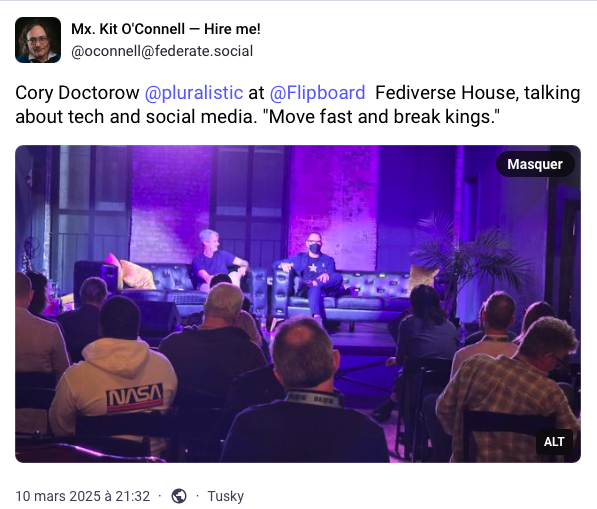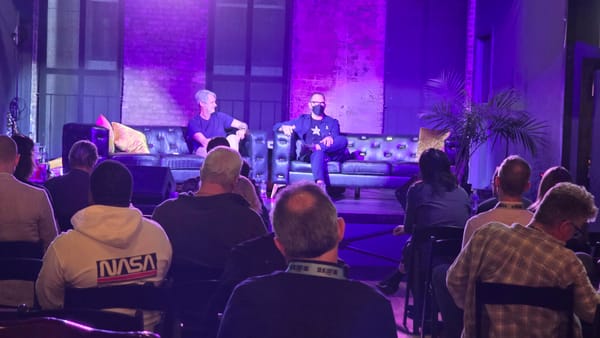I am a huge fan of Cory Doctorow.
Science fiction author. Brilliant analyst of technological trends. And creator of the term "enshittification" (yes, that's the original English term), the concept that digital platforms—whether because they serve both consumers and advertisers or because they've become near-monopolies—are destined to deteriorate over time.
A writer who really speaks to my interests.
Here’s the introduction to his book “The Internet Heist” (recently published in French as “Le Rapt d’Internet”), which perfectly captures his tone and scathing mindset:
This is a book for people who want to destroy Big Tech.
It's not a book for people who want to tame Big Tech. There's no fixing Big Tech.
It's not a book for people who want to get rid of technology itself. Technology isn't the problem. Stop thinking about what technology does and start thinking about who technology does it to and who it does it for.
This is a book about the thing Big Tech fears the most: technology operated by and for the people who use it.
History of the Destroyer Movement
In his book, Cory takes us back to the Chicago school of economics, especially Milton Friedman, the man behind the idea of the “virtuous monopoly.”
And he explains how this movement led to the rise of the billionaire clique that’s intent on running our modern world.
Take Mark Zuckerberg, for example. He now heads the Meta empire, but started in his Harvard dorm room in the 2010s. That’s where he supposedly grew Facebook from a website into the internet phenomenon we know today. At least, that’s how the story goes…
“Move fast, break things,” the iconic Tech slogan from that era is attributed to him. The philosophy that knowledge gained through experimentation matters more than the stability of what we build. You have to move quickly, iterate rapidly to outpace the rest of the world—lawmakers who can’t adapt fast enough and users who can’t take the time to properly assess a new technology. You have to move fast to dazzle.
This philosophy spread to many startup companies at that time, which rushed to follow in Facebook’s giant footsteps. Constantly adding new features, quickly moving on, never looking back. Like SpaceX, which relentlessly launches rockets often followed immediately by their explosion. All to learn, to outrun the competition, regardless of the environmental consequences.
Empires were built and Big Tech titans emerged before any discussion about their impact and responsibilities could even take place.
Mark Zuckerberg eventually acknowledged this approach was outdated, but the narrative of how these technology fortresses were built persists.
The Story vs. Reality
Legend has it that Mark Zuckerberg would change Facebook’s code during meetings.
The tech world quickly consolidated behind the myth of genius disruptor entrepreneurs. Of course I’m always wary of these stories but there is a reason behind the popularity of such tales.
We need to believe in saviors, don’t we?
We need to have a justification for why the CEO makes X times more than the least recognized employee. We need to make them heroes because this belief justifies excesses.
The entrepreneur myth extends the American dream in Silicon Valley. It perpetuates the image of the genius disruptor who overturns markets and changes the world. Anthony Galluzzo, in his book “The Myth of the Entrepreneur,” completely dismantles this myth, exposing it as a political tool that legitimizes a conservative social hierarchy behind a meritocratic facade.
We also need to justify why a CEO earns thousands of times more than their lowest-paid employee, so we turn them into heroes.
America was built on this myth. And this myth built American soft power. But today, that power isn’t so soft anymore—it’s given way to a more brutal form of domination.
The Kings are not just content to break things, they aim to break the people in their way too.
Adapting to the changing winds, Mark has backtracked on the progressive values he claimed to support just a few years ago.
And recently, Sarah Wynn-Williams, a former Facebook employee, was relentlessly attacked by Meta for her book “Careless People,” which exposes the toxicity surrounding the cult of personality built around Zuckerberg.
How Should We React?
How do you respond to a power that can destroy you, one that hides behind myths and statues erected to entrepreneurs who share neither our compass nor our values?
Big Tech was built as a common good, but these giants have diverted technology to serve the interests of the few.
And as monopolies consolidate behind these kings, they seem to lose whatever virtue they once had…
Back to Cory Doctorow.
At the Fediverse House Conference organized by Flipboard alongside the SXSW 2025 festival, he coined a brilliant slogan that summarizes his stance on Big Tech:

Cory proposes paths for political action.
Like imposing interoperable systems to force collaboration. Methods to prevent monopolies and liberate users.
Breaking dominant positions, escaping the system that creates singular entities. Giving back to consumers the power to choose and to citizens the power to decide.
Like a return to Tech’s roots. Rediscovering the joy of tinkering and DIY. The pleasure of creation and experimentation. There’s still time to get back to our roots. To return to creating technology that liberates people.
Stop relying on misplaced fascination with deeply flawed men who only seek to protect their empires.
Smash the kings and take down their statues.
MOVE FAST and BREAK KINGS
